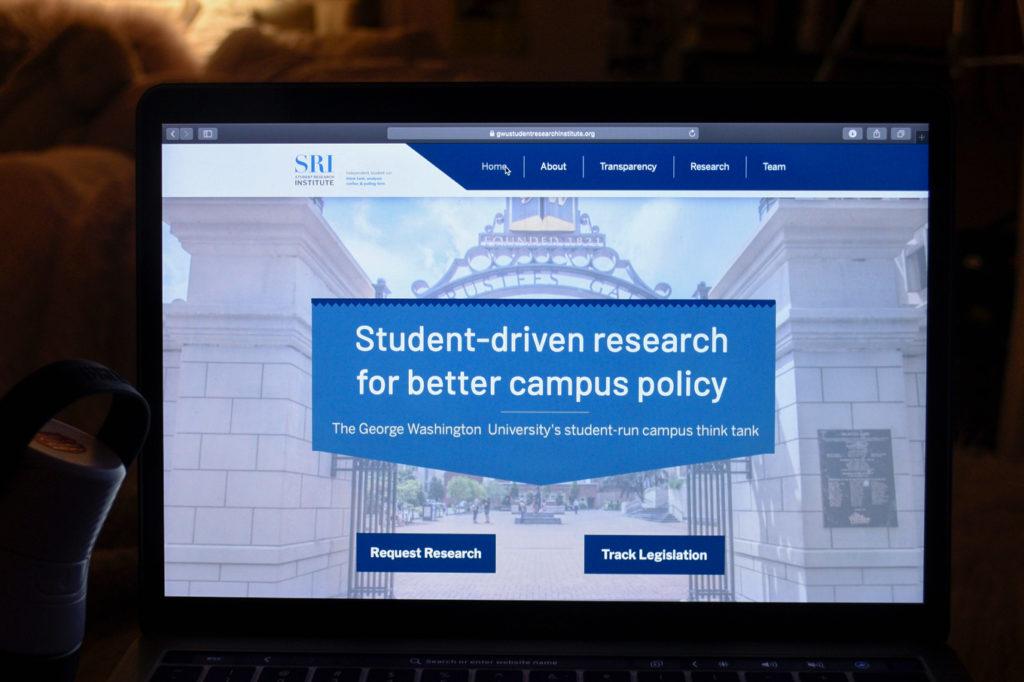A student-run think tank launched last month plans to conduct research on Student Association legislation and collect student body data on campus experiences to influence University and student leaders’ policies.
Members of the Student Research Institute said they will analyze student experiences like dining affordability and policies like Pass/No Pass to inform officials, SA leaders and student organizations on the student body’s opinions. Organization leaders said the group’s 12 researchers will each take a project related to students’ cultural, academic and financial affairs and publish data, like enrollment and tuition data, in “digestible” infographics on their website.
Junior Mark Warburton, the executive director of SRI and a former Hatchet reporter, said the group will provide an unbiased research-based platform to capture student sentiment and information on the University and SA policies. To maintain an apolitical stance, SRI is not a registered student organization nor has members in the SA and will receive private research grants they apply for to attain funding, he said.
Warburton said members’ projects will be used to influence legislation and resolutions in the SA Senate. He said the think tank will also track the senate’s legislation by listing senators and student organizations that sponsor various pieces of legislation.
Warburton said SRI members are working to publish an “interactive” graphic on their website that breaks down the SA budget and highlights which student organizations receive the most funding from the SA. He said he plans to work with the SA to offer additional information on students’ needs based on surveys conducted via email.
“The Student Research Institute provides information to the Student Association to understand what’s happening to the students themselves,” Warburton said. “It’s just a bridge between the two organizations. It’s a two-way street. Students can understand what’s happening in the Student Association, and the Student Association can understand what’s happening to the students.”
He said SRI has also been encouraging students on its Instagram and Facebook profiles to suggest issues on campus that the organization could tackle, like discounted Metro passes for students.
“There are some other think tank local organizations that are on campus like the Roosevelt Institute and the Alexander Hamilton Society,” Warburton said. “Those organizations are more focused on the community aspect of it, outside of the campus. The research institute is more focused on the students themselves and the companies that make the neighborhood on campus.”
Junior Joseph Kim, SRI’s director of campus affairs, said he has been working on a report to research the effectiveness of the undergraduate tuition discount on school affordability. He said he wants to examine how tuition rates, with the discount, will increase each year after officials stopped guaranteeing a fixed tuition rate starting with the Class of 2024.
He said he wants to work with similar student advocacy-focused student organizations in the future to collaborate on projects and provide deeper information on the campus community. He said he hopes more members will join the organization so they can continue to expand their work in the community.
“Being able to work with our local community, other organizations, being able to work on projects with other organizations based on their interests or their questions about what’s taking place in the community, whether it might be student enrollment or a specific demographic, being able to get more engaged with our community is definitely a vision that I have,” Kim said.
Junior Hayden Smith, the academic affairs director for SRI and a former Hatchet reporter, said he oversees research on academic updates, like GW’s current pass/fail policy and the 20/30 Plan, which officials paused in April but sought to increase the proportion of undergraduate STEM students to 30 percent and reduce the undergraduate population by 20 percent. He said SRI published his article last week summarizing all information officials had released about the pass/fail policy and its changes from last semester to this semester.
“Each school to an extent has its own policies, especially prior to the pandemic when it came to Pass/No Pass,” Smith said. “We wanted to publish to let students know that every undergraduate gets to pick one class, and that’s the maximum to use for Pass/No Pass. However, here are the appeal options if you need to use it for more than one.”
Smith said SRI reached out to the Office of Institutional Research and Planning to let them know that SRI can provide “objective” information about student sentiment to help administrators make “informed” policy decisions. He said SRI has not heard back from any officials they’ve contacted.
“We are really excited with the potential that SRI has,” Smith said. “We still have a lot more work to do to get off the ground, put word out there that we exist. We are not going to be useful to students if the students don’t know that we exist and that we have research they can view.”







